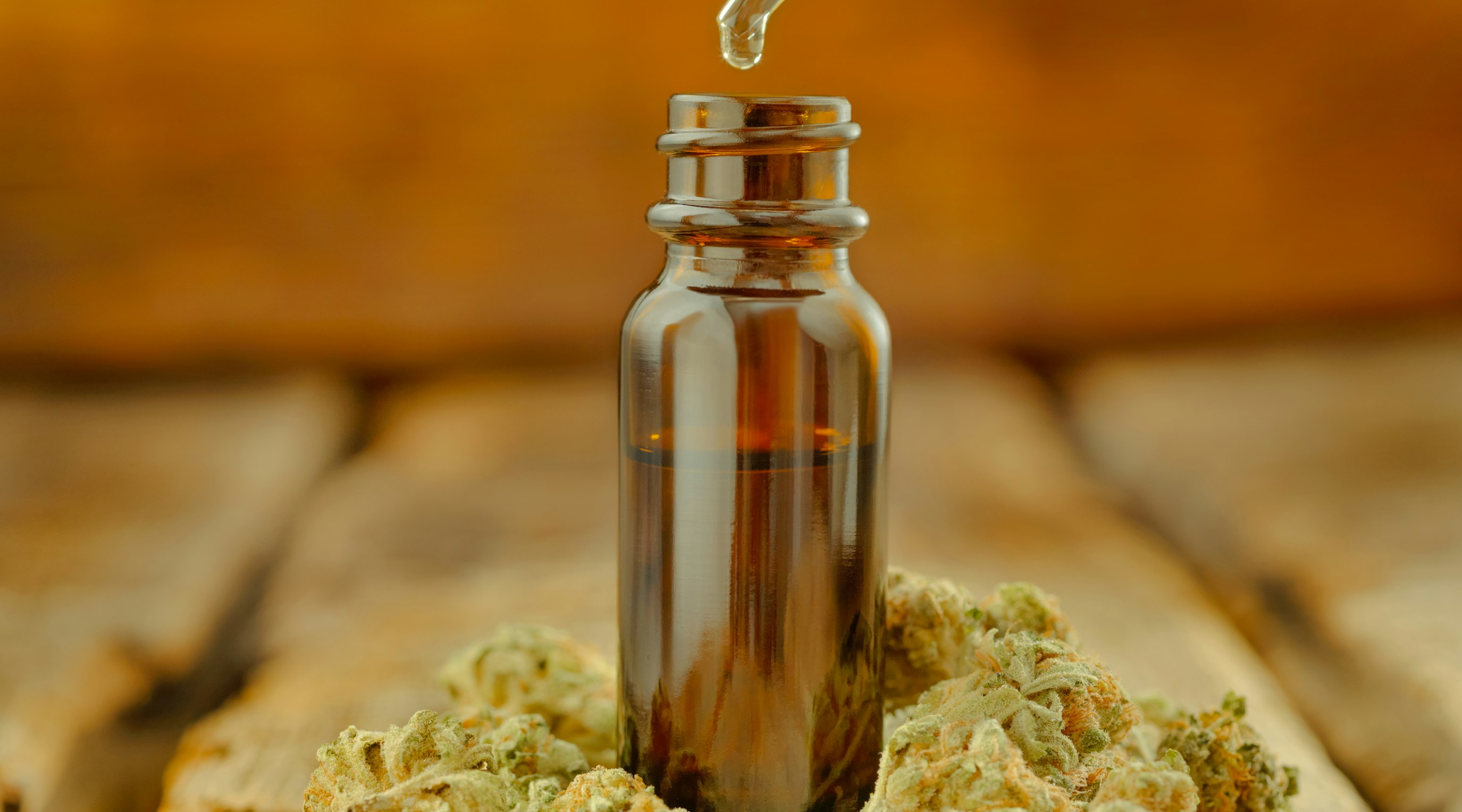A comprehensive guide on how to take THC oil
12 min read
Editorial Team
Contents
Starting your medical cannabis journey can be an understandably daunting process. Even for those who have prior experience with cannabis, the vast range of administration methods and the varying levels of THC potency can be overwhelming.
"How to take THC oil?" is a question we hear all the time, so in this guide, we will be focusing specifically on understanding THC oil treatment and the therapeutic benefits it can offer. Even if you have been prescribed THC oil for an extended period and already feel comfortable with it, you may find it useful to up your knowledge base.
What you should know before beginning THC oil treatment
Now, when it comes to dosage size and frequency, we cannot stress strongly enough just how vital it is to follow the prescription laid out by your doctor. Only doctors who are qualified and registered to prescribe medicinal cannabis will be able to offer THC oil as a therapeutic option.
That said, below is a rough guide of what we have seen prescribed for patients. This is not meant to be an instructional segment explaining how every single patient should take THC oil, only as a general guideline to what is currently prescribed.
THC oil beginner's guide
When starting THC oil treatment, our main advice is to start low and go slow. Many patients are instructed to take THC oil once a day for mild conditions or up to every 4 hours for long-term and serious health complications.
Your doctor will probably give you a range to stay within, say 10 mg to 25 mg per day. We suggest starting at the lower end of the range and only moving up in 5 mg increments if and when needed. This will allow you to work out what dose will be suitable for your level of symptomatic relief.
Ideally, you do not want to overshoot the symptom relief threshold and catch yourself accidentally administering too much THC. Not only will this confuse your treatment regime, you may also feel effects that are unwanted. Remember, THC is an intoxicant.
The different types of cannabis oil
Although your prescribing doctor will be the one to determine the type of THC oil and the THC potency that is right for you, it's still helpful to understand the options available. Typically, THC oil comes in two forms: full-spectrum and isolate.
- Full-spectrum oil: Full spectrum cannabis oil contains all the cannabinoids and terpenes produced by the source cannabis plant, including the cannabinodis (THC, CBD, etc.), and other beneficial compounds. This is believed to offer a more well-rounded therapeutic effect, known as the "entourage effect."
- Broad-spectrum oil: This form of oil contains a range of cannabinoids and terpenes, but the THC has been removed. It still offers the benefits of the entourage effect but without the psychoactive effects of THC. This type of oil is seen in the CBD market, but as the THC has been removed, it is redundant for THC oil treatment.
- Isolate oil: As the name suggests, this type of oil only contains isolated cannabinoid molecules - in this case, THC. This may be preferred for those who are sensitive to other cannabinoids or prefer a more targeted effect.
When selecting a THC oil, it's also essential to consider the potency. The concentration of THC can vary greatly, with some oils containing as little as 5% THC and others containing up to 90%.
What are the effects of consuming THC oil?
The effects of THC oil will vary based on a few key factors, including:
- The potency and dosage of the THC oil
- The patient's tolerance to THC
- The method of administration
- The patient's metabolism and body chemistry
THC oil can offer a range of therapeutic effects, including pain relief, appetite stimulation, muscle relaxation and recovery through reduced inflammation, and improved mood. Other therapeutic benefits of THC include neuroprotective properties and anti-nausea effects.
Depending on the dosage level, you may also experience psychoactive effects, such as euphoria and altered perception. These effects may be desirable for some patients but should always be monitored and kept under control with careful dosage management.
How long do the effects of THC oil last?
That is very much dependent on how you take your THC oil, the dosage, and the potency of the oil. Compared to other delivery methods such as vaporising, oral consumption has a slower onset time but a longer duration. However, this can vary from person to person.
Let's delve into this a little further next.
Understanding the different delivery methods for cannabis oil
- Oral consumption (ingestion): This method involves taking the THC oil orally, typically in the form of a capsule or tincture. As mentioned before, this method has a slower onset time, usually between 30 minutes to an hour, but can last anywhere from 4-8 hours depending on dosage and metabolism.
- Sublingual administration: This method involves placing the THC oil under the tongue, where it is absorbed into the bloodstream through the mucous membranes. The effects can be felt within 15-30 minutes and can last for up to 4 hours. This method cuts out the "first pass effect" associated with normal oral administration.
- Topical application: Cannabis oil can also be applied topically, usually in the form of a cream or ointment, to provide targeted relief for pain or inflammation. The effects can be felt within 15-20 minutes and may last up to 2 hours.
- Inhalation (vaporising): This method involves inhaling the vapour of heated cannabis oil through a vaporiser device. This method has the fastest onset time, with effects being felt almost immediately and lasting for approximately 2-3 hours.
Factors that can affect the efficacy and duration of THC oil
When THC is taken orally, it is digested and passes through the stomach into the liver. Here, it is metabolised into a more powerful cannabinoid called 11-hydroxy-THC which is anywhere between 6 and 12 times more potent than Delta-9 THC, which is the form of THC found in dried cannabis. This explains why some patients report feeling stronger effects from eating THC oil than from other delivery methods, such as vaporising.
But, when taken orally, the THC also goes through what is referred to as the "first pass effect".
This is where the liver breaks down and filters out a percentage of the THC before it reaches the bloodstream. This means that different individuals may have varying levels of efficacy when taking the same dose of oral THC oil. Factors that can affect things as complicated as include liver health, metabolism rates, and individual body chemistry, or as simple as what the patient has eaten recently.
For some patients, consuming their THC oil orally may have an intense psychoactive effect, which could discourage them from taking it and experiencing the well-documented potential benefits they desire. If you are prescribed oral THC oil, it is helpful to start low (dosage-wise) and go slow (with how often you re-dose).
Therefore, it's essential to work with your doctor to find the right dosage and method of administration that works best for you.
THC oil side effects in focus
Like any medication, THC oil can have side effects. However, these potential side effects may vary depending on the individual and their tolerance to THC. Some common side effects of THC oil may include:
- Dry mouth
- Dizziness or lightheadedness
- Changes in appetite
- Mood changes (euphoria, anxiety, or paranoia)
- Impaired memory and cognitive function
- Red eyes
- Muscle weakness
- Racing heartbeat
It's essential to monitor your own response to THC oil and communicate any side effects with your doctor. They can help adjust your dosage or try a different delivery method if needed.
This all precautionary, and as long as you stick to your prescription range and use the “start low, go slow” philosophy, you should not have to worry about negative side effects. A study that looked at over 3000 legal medical cannabis patients in the UK showed there are very few adverse side effects with prescription THC.
It is important to remember if you do take more than you intended or do feel an adverse effect, that these symptoms will pass and should only last two to three hours at the most before subsiding.
The residual effects of high doses of THC can persist for a couple of days, akin to experiencing mild jet lag or slight sleep deprivation. A slightly higher-than-usual dose of THC oil can also induce euphoria, uncontrollable laughter, and an overall sense of well-being.
Managing THC oil side effects
First, and most importantly, stay calm. You cannot overdose on THC oil.
High doses of THC can cause a spike in anxiety, so it's important to control your breathing and focus on slow and steady breaths. Heavy, unwanted side effects like panic or anxiety attacks should pass within an hour or so. Taking a dose of CBD oil may also help, as it has been shown in studies to help reduce the psychoactive effects of THC.
Here are a few other tips that may help alleviate unwanted side effects:
- Drink plenty of fluid. Water is great, but you might want to also have a sweeter drink at hand. THC drops the blood glucose level quite rapidly, which causes some of the potentially unpleasant feelings. A sugary drink can help those levels rise again quickly.
- Caffeinated drinks may be helpful for some patients, but in general, they are not recommended, especially if caffeine is a trigger for anxiety.
- You may feel the need to be in the company of someone you are close to or may feel the exact opposite. Both are totally normal for the situation. If you do feel like being left alone, make sure you have someone to check up on you.
- If you feel the need to vomit, this is most often a sign of higher-than-normal anxiety. Dont try to fight the feeling, as this can make it worse. Instead, try to relax and let your body do its thing.
- If you feel like you need medical help or are feeling overwhelmed, don't hesitate to call your doctor or go to the emergency room. This is especially important if you have a history of anxiety or panic attacks.
THC oil FAQs
What are the legal considerations for using THC oil in the UK?
In the UK, THC oil is legal when prescribed by a specialist doctor for certain medical conditions. It's not available over-the-counter or for recreational use. Patients must have a prescription and adhere to the dosage guidelines set by their healthcare provider.
How does the effectiveness of THC oil compare to other forms of medical cannabis?
THC oil is often considered more precise in dosage compared to other forms like dried flowers or edibles. Its effects are more consistent and can be tailored to individual needs, making it a preferred option for specific medical conditions requiring fine-tuned dosing.
What are the long-term effects of using THC oil?
Long-term effects of THC oil use are still being studied. Regular use may lead to tolerance, necessitating higher doses for the same effect. However, it's generally considered tobe a safe long term treatment option when taken under the supervision of a doctor.
Final thoughts on THC oil
While THC oil does come with the slight risk of unwanted side effects, emerging research is showing that the potential therapeutic benefits may far outweigh these.
It's essential to work with your healthcare provider to find the right dose and administration method that works best for you. With responsible use, THC oil may provide relief for various conditions and improve the overall quality of life for patients suffering from a wide range of health concerns.
Releaf understands the importance of medical cannabis in treating various medical conditions. With our tailored monthly packages, specialist consultations for medical cannabis, and a unique medical cannabis card for protection, you can access the treatment you need without worrying about the stigma.
Share article
Did you like this article?
It is important to seek medical advice before starting any new treatments. The patient advisors at Releaf are available to provide expert advice and support. Alternatively, click here to book a consultation with one of our specialist doctors.
Elevate your wellness with medical cannabis
Get comprehensive care, convenience, and confidence with an all-in-one treatment plan.
Am I eligible?Authors
Editorial Team
Article written by the Releaf Editorial Team, a group of seasoned experts in cannabis healthcare, dedicated to enhancing awareness and accessibility in the field through their wealth of knowledge and experience.
Editorial Policy
All of our articles are written by medical cannabis experts, guided by strict sourcing guidelines, and reference peer-reviewed studies and credible academic research. Our expert clinical team and compliance specialists provide valuable insights to ensure accuracy when required. Learn more in our editorial policy.
Need more help?










